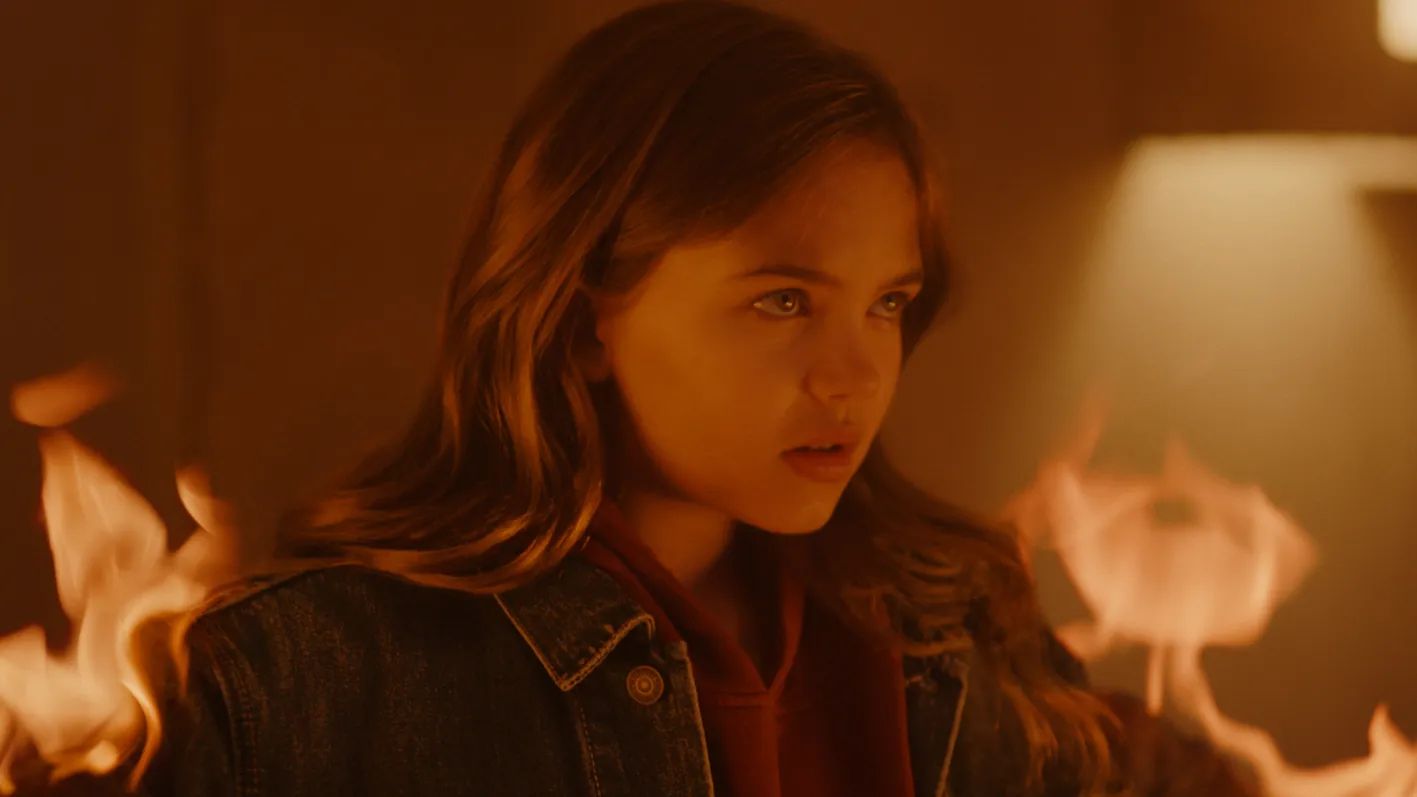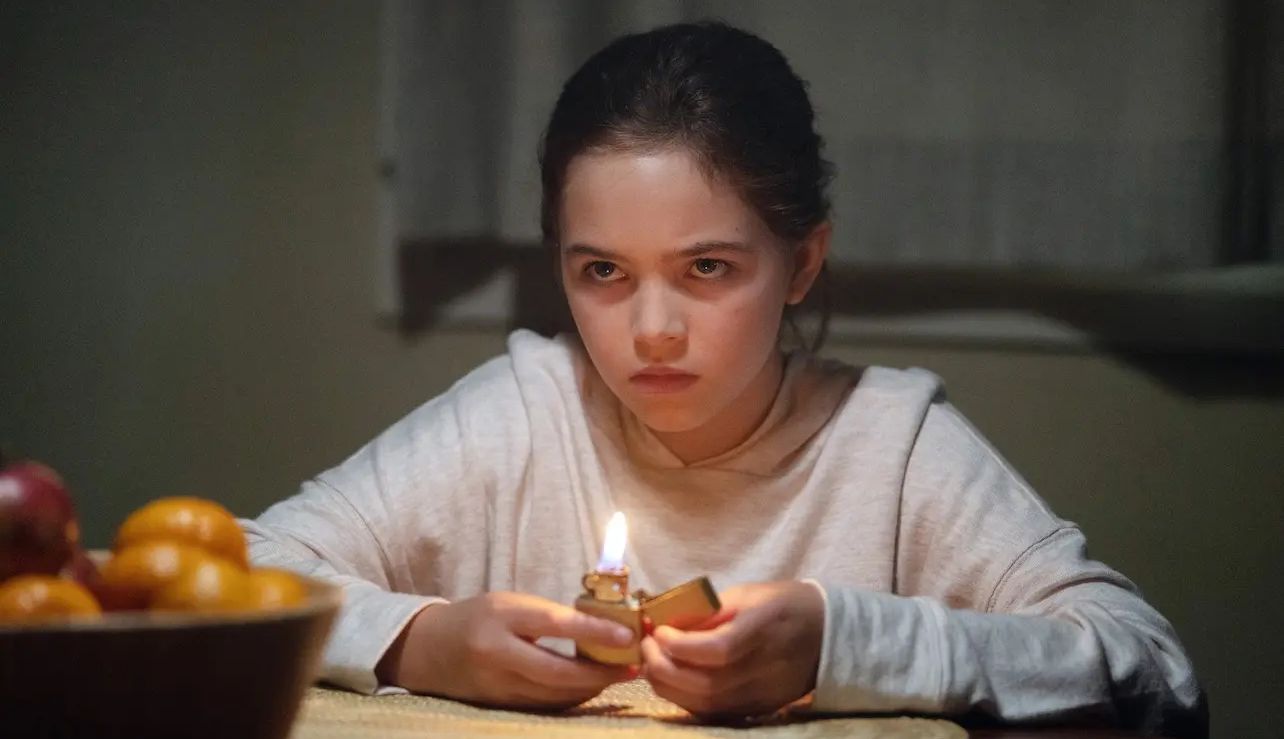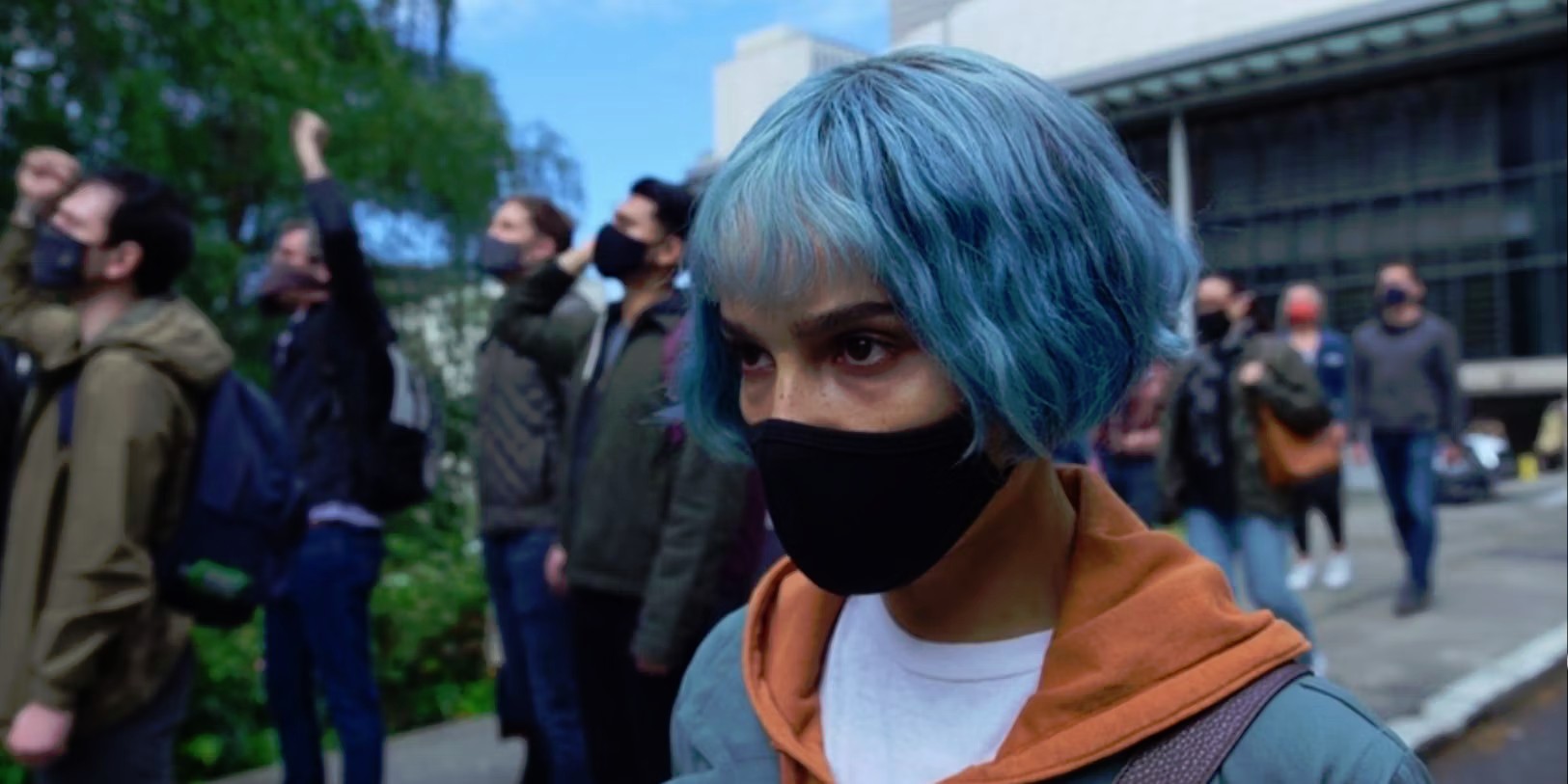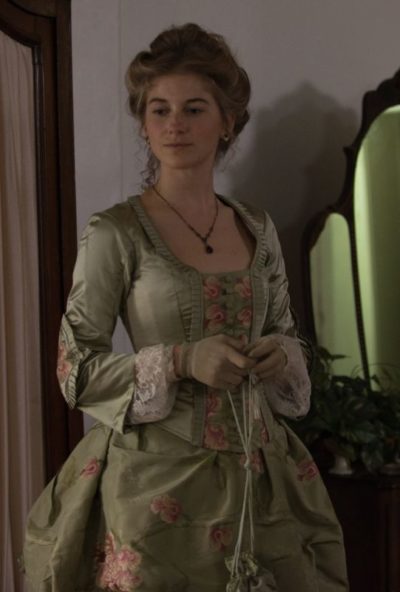★★★
“The fire-devil is back!”
 I must admit: While I always found the premise for Stephen King’s 1980 novel Firestarter interesting, I never read the book. 500 small-printed pages are just too much for me. The story itself shares some of its DNA with Carrie, with the difference that this here is about a younger child, not an adolescent, and instead of telekinesis the girl knows pyrokinesis, meaning she can create fire from nowhere and control it. It could be argued that King was just kind of re-using ideas from Carrie, making less of an effort to create something original as he did with other material. Opinions on the story seem to be split. Some think it’s a great novel, of the usual King quality; others think it’s a typical work from the time when King was writing as if he were on the run, and striking while the iron was hot (honestly, I don’t really see he has slowed down so much over the years).
I must admit: While I always found the premise for Stephen King’s 1980 novel Firestarter interesting, I never read the book. 500 small-printed pages are just too much for me. The story itself shares some of its DNA with Carrie, with the difference that this here is about a younger child, not an adolescent, and instead of telekinesis the girl knows pyrokinesis, meaning she can create fire from nowhere and control it. It could be argued that King was just kind of re-using ideas from Carrie, making less of an effort to create something original as he did with other material. Opinions on the story seem to be split. Some think it’s a great novel, of the usual King quality; others think it’s a typical work from the time when King was writing as if he were on the run, and striking while the iron was hot (honestly, I don’t really see he has slowed down so much over the years).
Anyway, the novel became a 1984 movie, with all the qualities and flaws a Stephen King adaptation had in the 80s, featuring then-child star Drew Barrymore (gosh, I just realize while I’m typing that she is as old as I am!) a considerable ensemble of actors, a soundtrack by Tangerine Dream and – for its time – impressive pyro special effects. The film’s reception was lukewarm but it went on to become a success on VHS. In Germany, the title translates as “The Firedevil”, which in German means somebody who likes to play with fire. A sequel, albeit unrelated in story and without any King input, came out as as a TV miniseries in 2002 to similarly questionable results as far as fan opinions go. The main character was still Charlie, but now all grown-up. Strangely, the villain of the original piece was still alive there which made zero sense if you witnessed his demise at the end of the movie.
So here is the 2022 version, produced by Blumhouse, a studio with a very good reputation for first-class horror movies today, and also gave us great non-genre movies like Whiplash. Martha de Laurentiis, co-producing wife of the late Dino de Laurentiis (involved in a number of King adaptations in the 80s) has a producer’s credit, although she died last year at cancer. Akiva Goldsman who was chosen to direct the movie before being replaced, also got a producing credit, which doesn’t necessarily mean much nowadays.
The new Firestarter does its best not to just repeat the story beats of the 1984 movie, though by doing so is less close to the original King novel. The beginning of the movie shows young girl Charlie (Armstrong) in school being bullied by one of those ugly red-haired boys we all know from 1970s movies (nasty then, nasty now – talk about discrimination against red-haired children!). It reminded me quite a bit of Carrie, though it’s just a few scenes and serves little more purpose than to illustrate Charlie’s problems in general.
Her parents (Efron – suddenly grown up; wasn’t he just a boy yesterday? – and Lemmon) have been on the run for a long time: After being involved in an experiment that gave them paranormal powers,the secret government organisation that conducted these experiments, “The Shop”, want their child. Therefore – and a bonus point to the screenwriter for taking modern communication and tracking opportunities into account – they have been staying away from the Internet and mobile phones. I was therefore surprised when Charlie in a key scene of the movie suddenly came up with one.
These forces are on the track of the family again, after an outbreak of fire in school and Charlie burns the arms of her mother in a fit of rage. It’s funny to compare the latter scene in old and new movies. Nothing much worth mentioning happened to the mother in the original, but a great fuss was made about it. Here, she has what feel like at least second-degree burns, and the parents behave as if it were nothing in front of Charlie. Let’s go have some ice-cream! What kind of message is being sent to young parents, folks?
The Shop is now under the management of Captain Hollister (Gloria Reuben), who send apparently disgraced operative John Rainbird (Greyeyes) to get Charlie back. She is seen by Hollister as having great potential, though original leader of the experiment, Doctor Wanless (Kurtwood Smith in a cameo), fears an unmeasurable threat from the girl’s potential when she comes into full control of her power. Charlie’s mom resists Rainbird and dies in the confrontation, causing father and daughter to go on the run, where Dad’s ability to influence people telepathically comes in handy.
They find sanctuary with recluse Manders (John Beasley), only to be discovered by the police and Rainbird shortly after. While Charlie gets away, her father is caught and is brought back to the lab. After training to control her powers in the woods, a scene that feels two minutes long, Charlie comes to free her Dad. Although “The Shop” does its best to get her under control, the girl prevails, burning all those who threaten her.
 Firestarter is a strange beast with a difficult task: Retaining the core of the original story but not being to close too the orignal movie. Paying tribute to current political correctness, yet not changing the original material too much. For most of the time, they do fine, I’d say. Some changes did catch my eye: the conflict between the parents wasn’t there, as far as I remember, in the original movie. The mother wants Charlene to train so she can control her powers, the father would rather she suppress them, for who knows what may come out of them being released? In contrast, the original spent more time with Dad and daughter in the lab, the evil Rainbird slowly gaining Charlie’s confidence in order to kill her when appropriate. It went more for slow menacing tension – also the approach of King’s novel – while this plays more as a “fugitives-on-the-run” scenario.
Firestarter is a strange beast with a difficult task: Retaining the core of the original story but not being to close too the orignal movie. Paying tribute to current political correctness, yet not changing the original material too much. For most of the time, they do fine, I’d say. Some changes did catch my eye: the conflict between the parents wasn’t there, as far as I remember, in the original movie. The mother wants Charlene to train so she can control her powers, the father would rather she suppress them, for who knows what may come out of them being released? In contrast, the original spent more time with Dad and daughter in the lab, the evil Rainbird slowly gaining Charlie’s confidence in order to kill her when appropriate. It went more for slow menacing tension – also the approach of King’s novel – while this plays more as a “fugitives-on-the-run” scenario.
But the biggest change is the John Rainbird. In the original, he was played by elderly over-weight “evil uncle” George C. Scott. In no circumstance would he ever have been considered a Native American. Here, he is played by Canadian and Cree actor Michael Greyeyes, though Rainbird in the books was Cherokee. Perhaps because Hollywood thinks it can’t allow villains to be an ethnic minority, the character is slightly changed: Rainbird works for the organisation, because it is suggested they are too powerful. He himself was betrayed by them, and seems to have been part of the experiment, gaining certain supernatural powers. Here, Rainbird helps Charlie, ready to accept his death. Strangely, she spares his life and while the building behind her burns, takes his hand and they walk away. Make out of that ending what you want: it’s definitely not King’s.
It seems a lot of critics disliked the new movie. As a whole I can’t condemn taking a different approach to the story. I’m not even sure if I would call the new movie “woke”, though it definitely has woke moments. Director Keith Thomas, does fine, I think. The movie is atmospheric, has more focus on the parents and their differences over how to raise their daughter, and there is some genuine tension, e. g. when Rainbird confronts Charlie’s mother. What really astonished me is the musci by John Carpenter and his son Cody. Yes, that Carpenter. I don’t know how they got him to do the music: he directed the King adaptation Christine in the 80s and was the original choice for that Firestarter, so that may have something to do with it.
What’s my judgement? The new movie isn’t bad. Acting-wise I’d even say it’s better; I especially prefer Michael Greyeyes’s performance to the ham-fisted approach of Scott. But if I had to chose… I’d stick with the original. That had the “oh, she is so cute” Barrymore factor and a really, really impressive cast, which this movie only can dream of. The pyro FX party at the end is much more impressive than the toned-down finale here. There is also the “zeitgeist factor” to consider. In 1984 you could still accept and be fascinated by the idea of a girl who can create and control fire. In 2022, with Pyro, Dark Phoenix or Sunspot doing similar or more impressive things, Charlie’s powers just aren’t as fascinating as they used to be.
Dir: Keith Thomas
Star: Zac Efron, Ryan Kiera Armstrong, Sydney Lemmon, Michael Greyeyes

 This is one of the more successful efforts to spin a conspiratorial narrative – at least until the final act, where it topples over into implausibility. It’s a bit like how QAnon were not wrong about the rich and powerful being involved in sex trafficking… it just wasn’t out of the basement of a pizza restaurant. The heroine here is Sofia (Gudic), a journalist who is investigating a series of odd murders, in which powerful men are killed in highly compromising positions. These are assassinations carried out by an escort-assassin, Theda – yeah, one of the less subtle anagrammatic names I’ve seen – on behalf of a shadowy, super-powerful group of the wealthy and famous, under the oversight of Zane (Cassavetes).
This is one of the more successful efforts to spin a conspiratorial narrative – at least until the final act, where it topples over into implausibility. It’s a bit like how QAnon were not wrong about the rich and powerful being involved in sex trafficking… it just wasn’t out of the basement of a pizza restaurant. The heroine here is Sofia (Gudic), a journalist who is investigating a series of odd murders, in which powerful men are killed in highly compromising positions. These are assassinations carried out by an escort-assassin, Theda – yeah, one of the less subtle anagrammatic names I’ve seen – on behalf of a shadowy, super-powerful group of the wealthy and famous, under the oversight of Zane (Cassavetes).




 ★★★
★★★ Kimi indirectly discusses this attitude, but also seems to make a clear point that there is a need to leave your own four walls sometimes, because not everything can be handled from your laptop. That said, it’s quite disturbing how much
Kimi indirectly discusses this attitude, but also seems to make a clear point that there is a need to leave your own four walls sometimes, because not everything can be handled from your laptop. That said, it’s quite disturbing how much  I must admit: While I always found the premise for Stephen King’s 1980 novel Firestarter interesting, I never read the book. 500 small-printed pages are just too much for me. The story itself shares some of its DNA with Carrie, with the difference that this here is about a younger child, not an adolescent, and instead of telekinesis the girl knows pyrokinesis, meaning she can create fire from nowhere and control it. It could be argued that King was just kind of re-using ideas from Carrie, making less of an effort to create something original as he did with other material. Opinions on the story seem to be split. Some think it’s a great novel, of the usual King quality; others think it’s a typical work from the time when King was writing as if he were on the run, and striking while the iron was hot (honestly, I don’t really see he has slowed down so much over the years).
I must admit: While I always found the premise for Stephen King’s 1980 novel Firestarter interesting, I never read the book. 500 small-printed pages are just too much for me. The story itself shares some of its DNA with Carrie, with the difference that this here is about a younger child, not an adolescent, and instead of telekinesis the girl knows pyrokinesis, meaning she can create fire from nowhere and control it. It could be argued that King was just kind of re-using ideas from Carrie, making less of an effort to create something original as he did with other material. Opinions on the story seem to be split. Some think it’s a great novel, of the usual King quality; others think it’s a typical work from the time when King was writing as if he were on the run, and striking while the iron was hot (honestly, I don’t really see he has slowed down so much over the years). Firestarter is a strange beast with a difficult task: Retaining the core of the original story but not being to close too the orignal movie. Paying tribute to current political correctness, yet not changing the original material too much. For most of the time, they do fine, I’d say. Some changes did catch my eye: the conflict between the parents wasn’t there, as far as I remember, in the original movie. The mother wants Charlene to train so she can control her powers, the father would rather she suppress them, for who knows what may come out of them being released? In contrast, the original spent more time with Dad and daughter in the lab, the evil Rainbird slowly gaining Charlie’s confidence in order to kill her when appropriate. It went more for slow menacing tension – also the approach of King’s novel – while this plays more as a “fugitives-on-the-run” scenario.
Firestarter is a strange beast with a difficult task: Retaining the core of the original story but not being to close too the orignal movie. Paying tribute to current political correctness, yet not changing the original material too much. For most of the time, they do fine, I’d say. Some changes did catch my eye: the conflict between the parents wasn’t there, as far as I remember, in the original movie. The mother wants Charlene to train so she can control her powers, the father would rather she suppress them, for who knows what may come out of them being released? In contrast, the original spent more time with Dad and daughter in the lab, the evil Rainbird slowly gaining Charlie’s confidence in order to kill her when appropriate. It went more for slow menacing tension – also the approach of King’s novel – while this plays more as a “fugitives-on-the-run” scenario.
 ★★★
★★★ The German-Canadian co-production is split into two feature-length parts – “Dragonfly” and “Energy” – but is absolutely a single entity, so that’s how it’ll be covered here. I was braced for something truly dreadful, after reading some particularly scathing reviews, and seeing no less than
The German-Canadian co-production is split into two feature-length parts – “Dragonfly” and “Energy” – but is absolutely a single entity, so that’s how it’ll be covered here. I was braced for something truly dreadful, after reading some particularly scathing reviews, and seeing no less than  ★★★
★★★ Game of Thrones, this clearly isn’t. But both Chris and I were struck by the similarities between what befalls the main character here, and the re-programming which Anya Stark underwent at the hands of the Faceless Men. Because the first, and arguably key, step in both is to destroy the existing personality, so there is a blank slate – the phrase “tabula rasa” is explicitly used here – on which the new character can be drawn. In this case, the victim is Isabel Porter (Gallerani), a young woman who has sunk into depression after the death of her parents. She opts for a stay at the Rosewood Institute, a highly regard mental sanatorium in Baltimore.
Game of Thrones, this clearly isn’t. But both Chris and I were struck by the similarities between what befalls the main character here, and the re-programming which Anya Stark underwent at the hands of the Faceless Men. Because the first, and arguably key, step in both is to destroy the existing personality, so there is a blank slate – the phrase “tabula rasa” is explicitly used here – on which the new character can be drawn. In this case, the victim is Isabel Porter (Gallerani), a young woman who has sunk into depression after the death of her parents. She opts for a stay at the Rosewood Institute, a highly regard mental sanatorium in Baltimore.